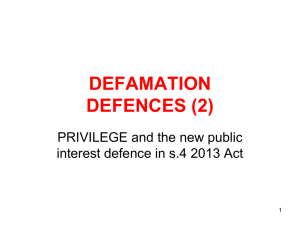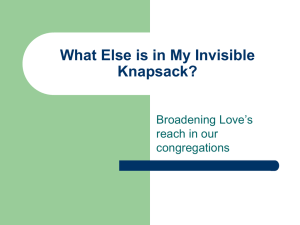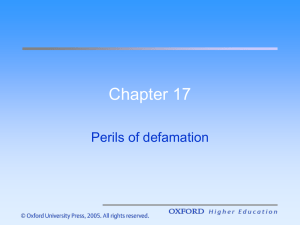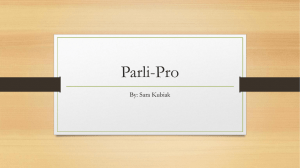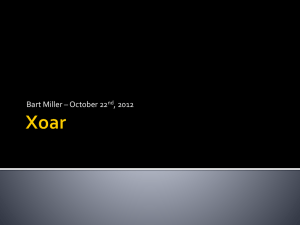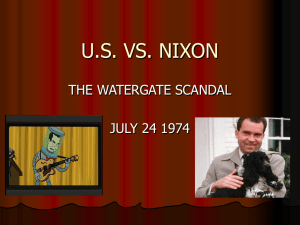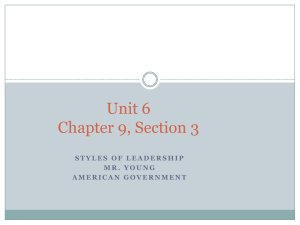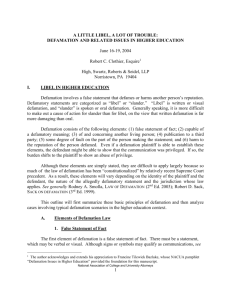Privilege - Think.IO
advertisement
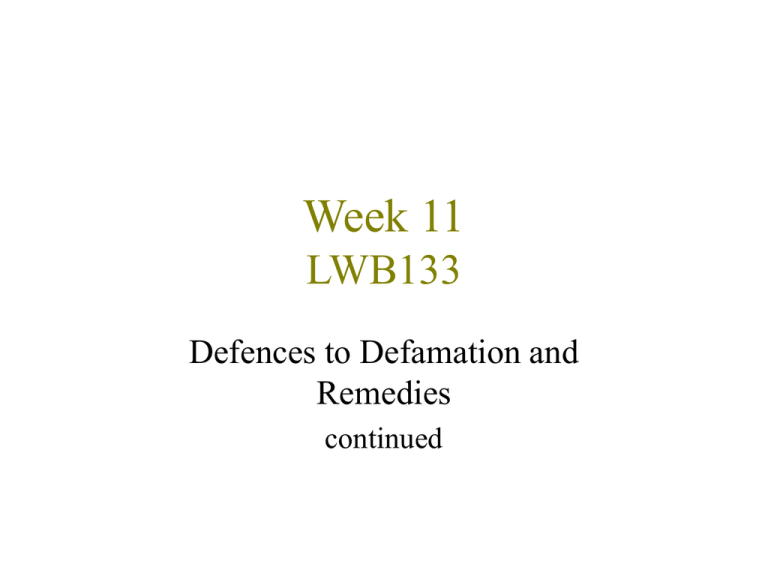
Week 11 LWB133 Defences to Defamation and Remedies continued Privilege Two types of privilege: • Absolute privilege • Qualified privilege Absolute Privilege Some occasions considered so important that the free exchange of views without the threat of liability in defamation is necessary. Absolute Privilege Common law • Statements made in the course of parliamentary proceedings • Statements made in the course of judicial (and quasi-judicial) proceedings • Communications between a solicitor and client in relation to judicial proceedings • Communications between ministers of state in the course of official duties • Communications between spouses Absolute Privilege Queensland - ss10-12 Defamation Act 1889 • s10 - speeches in parliament; petitions to parliament; and reports to parliament • s11 - judicial proceedings • s12 - reports of official inquiries Qualified Privilege Common law • The publisher has an interest or duty (legal, moral or social) to publish AND • The recipient has a corresponding interest or duty to receive it Reciprocity is essential Qualified Privilege Matters of public interest – reports of parliamentary proceedings, fair and accurate reports of judicial proceedings, inquiries... • Interest of the recipient – legal, moral or social duty to publish and an interest to receive the information • Community of interest – employment, educational... • Interest of the publisher – attacks on reputation or property Qualified Privilege Qualified as the protection may be lost if: • Publisher is actuated by malice; or – knows matter to false, recklessly indifferent, ill will or spite, irrelevant material • Extent of publication exceeds what is reasonable Qualified Privilege Queensland - ss13&16 Defamation Act 1889 • s13(1) - publish in good faith for the information of the public … a fair report of: (a) (b) (c) (d) (e) (f) (g) Proceedings of parliament extracts of parliamentary papers proceedings of court proceedings of Commission inquiries government department notices proceedings of local government, boards… proceedings of public meetings as far as they relate to matters of public concern Qualified Privilege • s13(2) - “good faith for the information of the public” Publisher not actuated by ill will or improper motive; and The manner of the publication is such as is ordinarily and fairly used in the case of publication of the news • s17 - burden of proving absence of good faith lies on the party so asserting Qualified Privilege • s16(1) - publications made in good faith: (a)by a person with lawful authority over another in the course of censure of the other (b)seeking redress or remedy for a private or public wrong from a person who has authority over the person defamed (c)for the protection of the interests of the publisher or other person or for the public good (d)In answer to an inquiry/giving information to a person, reasonably believed to have an interest in knowing the truth Qualified Privilege s16(1) - publications made in good faith (cont): (e)giving information to person with the belief they have an interest in knowing the truth (f)on the invitation or challenge of the person defamed (g)to answer or refute other defamatory material published (h)in the course of discussion of some subject of public interest which is for the public benefit Good Faith s16(2) - “good faith” Publication is relevant to matters in subsec(1) Publication does not exceed what is reasonable Publisher not actuated by ill will or improper motive Publisher did not believe the defamatory matter to be untrue Constitutional Protection Lange v Australian Broadcasting Commission Right contained in the Australian constitution was a negative right not to have the right to freedom of political expression unreasonably restrained by either the common law or statute-based law of defamation Constitutional Protection For the defence to be available it must be proven: • The communication is about a government or political matter; • Publisher’s conduct was reasonable; and • Publisher was not actuated by malice Defamation Remedies Remedies • Interlocutory injunction • Damages • Stop writ Injunctions • Discretionary remedy • Mandatory injunction – Requires a person to do something • Prohibitory injunction – Restrains a person from doing committing or repeating an act • Interlocutory injunction – Continues until hearing or further order Reluctance to Grant Injunction • Right to be heard by jury • Freedom of speech • Right to protect reputation • Power exercised only in the clearest of cases – Shiel v Transmedia Productions Ltd Interlocutory Injunction Plaintiff establish: • no real grounds for supposing that the defendant will succeed upon any defence; • matter clearly defamatory; • if successful, plaintiff recover more than just nominal damages Damages Primary remedy • To compensate the plaintiff for injury suffered to reputation • Determination by jury Assessment • • • • • • nature and extent of the defamatory publication effect of the defamation on those who read it method of the publication position and standing of the plaintiff publication of any retraction or apology conduct of the defendant from the time of publication to the verdict Types of Damages Actual pecuniary loss Damages to the feelings as well as reputation Aggravated damages Exemplary or punitive damages Mitigation Relevant factors include: • Apology or retraction; • Recovery in other actions in respect of the same matter; • Poor reputation; • Truth; and • Absence of malice

